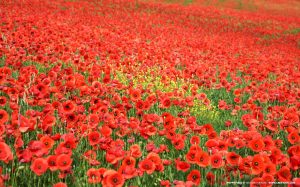 On the eleventh hour of the eleventh day in the eleventh month of 1918, an armistice ended World War 1. More than 9 million soldiers died in the war, with 20 million wounded. The war ended but a generation was lost or crippled. At the Battle of the Somme, the British alone suffered more than 400,000 casualties, with total numbers for all combatants more than one million.
On the eleventh hour of the eleventh day in the eleventh month of 1918, an armistice ended World War 1. More than 9 million soldiers died in the war, with 20 million wounded. The war ended but a generation was lost or crippled. At the Battle of the Somme, the British alone suffered more than 400,000 casualties, with total numbers for all combatants more than one million.
Today, we use November 11 to celebrate our veterans, but as we should applaud the living, we must remember the dead, both those who fell during battle and those who suffered yet survived.
World War 1, in spite of, or perhaps because of, its horrors, produced memorable poetry, often written by men who would soon themselves fall. Alan Seeger, an American, wrote “I Have a Rendezvous with Death.” He died in 1916 as a volunteer in the French Foreign Legion.
I HAVE a rendezvous with Death
At some disputed barricade,
When Spring comes back with rustling shade
And apple-blossoms fill the air—
I have a rendezvous with Death
When Spring brings back blue days and fair.
It may be he shall take my hand
And lead me into his dark land
And close my eyes and quench my breath—
It may be I shall pass him still.
I have a rendezvous with Death
On some scarred slope of battered hill,
When Spring comes round again this year
And the first meadow-flowers appear.
God knows ’twere better to be deep
Pillowed in silk and scented down,
Where love throbs out in blissful sleep,
Pulse nigh to pulse, and breath to breath,
Where hushed awakenings are dear…
But I’ve a rendezvous with Death
At midnight in some flaming town,
When Spring trips north again this year,
And I to my pledged word am true,
I shall not fail that rendezvous.
For a more gritty and realistic portrayal of the war, see Siegfried Sassoon’s poems. A British soldier, Sassoon protested the war while fighting it. “Suicide in the Trenches” is, predictably, grim in its portrayal of life on the front and biting when it highlights the disconnection between his reality and those who ignorantly support the war.
I KNEW a simple soldier boy
Who grinned at life in empty joy,
Slept soundly through the lonesome dark,
And whistled early with the lark.
In winter trenches, cowed and glum,
With crumps and lice and lack of rum,
He put a bullet through his brain.
No one spoke of him again.
. . . .
You smug-faced crowds with kindling eye
Who cheer when soldier lads march by,
Sneak home and pray you’ll never know
The hell where youth and laughter go.
 Bert Wheeler
Bert Wheeler
 Jeff Haymond
Jeff Haymond
 Marc Clauson
Marc Clauson
 Mark Caleb Smith
Mark Caleb Smith
 Tom Mach
Tom Mach